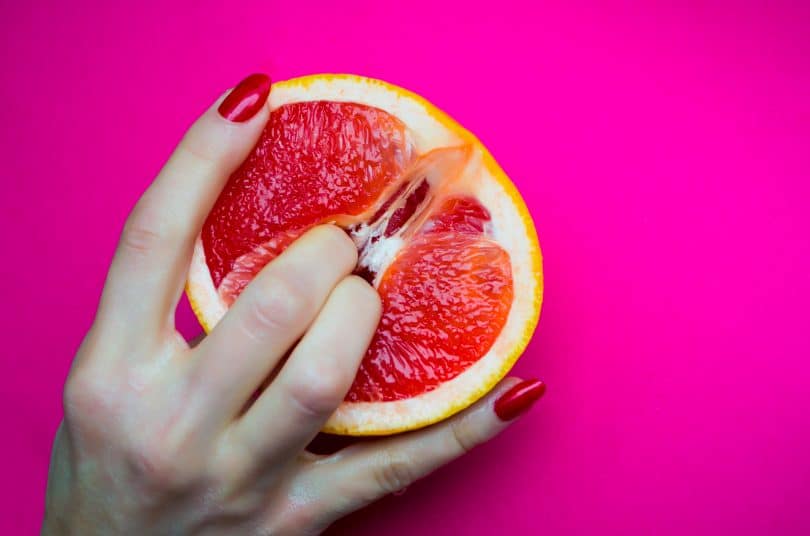Why do some people find it so difficult to talk about sexual pleasure? For too long now sex and orgasms have been a crass topic of conversation. For too long it has been considered inappropriate to discuss the desire for pleasure in sexual intercourse. For too long the power and incredible abilities of orgasms have been ignored. As the world continues to shift and new voice’s are beginning to be heard, new research and discovery is imminent. The evidence that the endorphin release triggered from orgasms assist with pain management is undoubtable. However, the issue lies with society’s view on pleasure itself.
Pleasure, for some reason, is not good. Especially, unfortunately, in women. The establishment and patriarchy would far farther people used pain killer medicines to treat pain, instead of finding a natural remedy that might involve sexual desire. But why is there such a stigma around orgasms? And how much can we learn from them in regards to pain relief?
Welcome to our little publication, where we go over everything relevant in the wide world of weed. Keep up by subscribing to THC Weekly Newsletter, and also get direct access to offers on vapes, edibles, and other paraphernalia, as well as deals for cannabinoid compounds like HHC-O, Delta 8, Delta 9 THC, Delta-10 THC, THCO, THCV, THCP & HHC. Check them out in our “Best-of” lists. Please keep in mind.. *cannabinoid products are not for everyone, and we advise that people only use the products they are comfortable with using.
What is an Orgasm?
An orgasm is a phenomenon that doesn’t seem to get the credit it deserves. It’s quite incredible that our bodies, when doing the correct things and feeling good, can reach a peak of pleasure and euphoria that can feel – for some – like an out of body experience. There are elements of nature that seem l magical, and an orgasm is most definitely one of those. Orgasms can occur during sexual activity with yourself, someone else or multiple people. They are the peak of pleasure. Medical News Today writes:
“The body releases tension, and the perineal muscles, anal sphincter, and reproductive organs rhythmically contract. Males will usually ejaculate when reaching an orgasm and females will experience vaginal wall contractions. Females may also ejaculate during sexual activity or when experiencing an orgasm.”
There are considered to be four stages to an orgasm. The first stage is excitement, the second stage is plateau, the third stage is orgasm and the final stage is resolution. Depending on how you experience an orgasm, the pleasure can feel concentrated around the genitals or can sometimes be an entire body experience. The female and male orgasm are often considered to be slightly different.
Male
Male orgams are usually shorter than women’s, lasting on average around 10 seconds. However, it is common for 1 to 2 teaspoons of semen to be ejaculated out of the penis. This is because the male orgasm has a biological purpose. The semen is used to fertilise the eggs and reproduce. After sex, it is usually difficult for the man to engage in sexual activity for a while after.
Female
Female orgasms can last around 20-35 seconds, and the pleasure can often spread throughout the body. Women can ejaculate also, but it is less common – with around 10-50% of women being able to. Some women can reach orgasm from intercourse, whilst others prefer clitoral stimulation. It’s also usual for women to have a shorter recovery period.
The Orgasm Gap
Whilst there are differences in orgasms from gender to gender, there are also differences from person to person. Ultimately, all orgasms have a great deal of similarities – they both release oxytocin (the pleasure chemical). In fact, the narrative that the two orgasms are different can assist the gender gap. The gender gap is the unfortunate truth that heterosexual men will reach orgasm during sex far more often than heterosexual women will. In fact, it is believed that 95% of these men will climax during sex, with only 6% of women being able to make that claim. However, 39% of these same women said that they orgasm during masturbation. The orgasm gap is a cultural problem, and is built on years and years of misinformation and stigma surrounding female anatomy. Forbes writes:
“Understanding women’s anatomy is fundamental to knowing what you like and feeling empowered to show a partner how to achieve it. Stereotypically, the clitoris is presented as something that people either can’t find or don’t understand.”
The problem here is pleasure. For some reason wanting pleasure, especially as a woman, is considered a hedonistic and lesser desire. The clitoris wasn’t even acknowledged as a sexual organ until 2005 when an Australian urologist named Hellen O’Connell shon a light on it. But why did it take this long? Surely an organ that can cause pleasure and, in certain ways, take away pain should be championed, explored and understood. However, a Guardian article discussing this topic has this as its headline: the sole function of the clitoris is female orgasm. Is that why it’s ignored by medical science?
Orgasms are Bad
Whilst both male and female orgasms can be used to cause euphoria and potentially take away pain, it’s important to realise why there’s more stigma around one of them in particular. Firstly, the male orgasm is considered to be a reproducing necessity. No male orgam means no sperm which means no child. However, it is too simplified to suggest that female orgasms are pointless. Stat News writes:
“researchers have suggested that orgasms persist because they have a psychological function in reproduction — they feel good, so they encourage women to have more sex.”
In addition, pleasure should be considered an essential part of living. Not only does it help take away pain, but it also helps us to enjoy existence. For some reason, there is an old-fashioned agenda in the establishment that wants to ensure that sexual activity is kept solely for reproduction and, therefore, male orgasm and pleasure is the only important part.
However, the orgasm revolution is happening, and it’s important that more and more people begin to realise that orgasms are important for everyone. Wanting pleasure is not a sin, it’s a human right. Plus, there are many health benefits of orgasms.
Health Benefits
Pain
The endorphins and oxytocin that are released during an orgasm have natural pain-relieving abilities. If you’re suffering from cramps, a headache or joint pains – an orgasm may give you immediate pain relief. These sorts of moderate pains are usually given paracetamol, ibuprofen or even CBD as a means to remedy them. However, what if people were encouraged to use sexual stimulation as an alternative? It’s a fact that the pain would go away faster. Hannah Steves suffers from chronic pain, and she writes in the Metro about her use of orgasms as a means of medication:
“Orgasms will always be my painkiller because it works for everything – aching joints, fibromyalgia pains, period cramps, headaches and stomach problems. While I will always have hope that medical advancement is possible, I am content knowing that pleasure works for me.”
She also writes in more detail about how the pleasure helps her:
“Each one only expels the pain for approximately 10 to 30 minutes but the calming effect on my body does lessen it over the course of a day.”
Not only does the pain subside instantly from the orgasm, but it also calms her body down for the rest of the day.
Anxiety
Not only can sexual pleasure help with pain and be used as a potential replacement for certain moderate pain killers, but it also can assist with anxiety. The same chemical, oxytocin, that assists with pain can also help relieve stress. The peak of an orgasm can simulate the peak of exercise, which often helps with anxious thoughts and stresses too. The BBC writes:
“A 2006 book exploring the experiences of over 2,600 women found that 39% of them masturbated to relax”
Masturbation and reaching orgasm can help the mind to relax, and empty itself. The focus on pleasure is similar to a meditation exercise. So often anxiety and stress derives from a busy mind that won’t stop working, orgasms help to focus it on one single point.
Sleep
None of this information is that mind-boggling. In a sense, don’t you feel like you knew all this already? However, orgasms and sexual pleasure are deemed so insignificant that they’re so rarely taken seriously. Not only do orgasms help with pain and anxiety, they also help with sleep deprivation. Sleep writes:
“Cortisol — a hormone that induces alertness and excitement — decreases following orgasm. This combination of hormonal processes makes people feel tired and ready for sleep.”
Not only can orgasms help you sleep, but they can also help you sleep deeper and for longer. The level of relaxation you experience post-orgasm is a state that many medications try to trigger in people. However, there’s a natural way of reaching this through an orgasm.
Conclusion
The orgasm has not been given the love, care and attention it deserves by society. For too long, the female orgasm specifically has been ignored due to the fact it does not directly assist in the reproductive process. However, the orgasm revolution is upon us, and more work is being done to balance the gap between men and women. In addition, the research into orgasm as a medication is increasing. However, more needs to be done. There is a genuine, natural, pain-relieving chemical within our bodies that is triggered by orgasm. It can be harnessed… if we’re able to stop stigmatising it.
Welcome readers! You’ve made it to CBDtesters.co / Cannadelics.com, your ultimate website for fully-rounded news covering the cannabis and psychedelics fields of today. Come thru daily to stay in-the-loop on the morphing landscape of cannabis and psychedelics, and sign up for The THC Weekly Newsletter, so you’re never late on getting a story.







